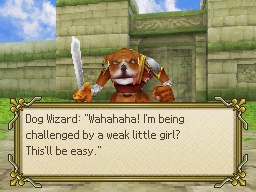There are plenty of role-playing games that capitalize on cuteness in order to attract a younger, more feminine crowd, and My World, My Way openly embraces this category. It also attempts to be more than just another pretty face by introducing a unique ability that lets you personalize your adventure; you can tweak nearly every aspect of the game, from monster levels to cash flow, by pouting. Though this level of freedom is a pleasant, convenient twist, the game is still extraordinarily bland and full of tedious filler, resulting in an ultimately unsatisfying journey.
You're cast as Elise, a pampered princess enjoying a life of luxury. Eventually Elise realizes that she has everything except a boyfriend and immediately throws a party in an attempt to find one. When she tries to charm a handsome adventurer, however, the unthinkable happens: He rejects her. Humiliated, Elise embarks on a quest to win him over by slaying monsters. The plot is extremely dull and fails to provide much in the way of progression, hinging on Elise's hope to impress her adventurer. If either Elise or her intended were likable, the plot might be worth muddling through, but as both are spoiled children, the game lacks a key motivating factor. There are very few interesting storyline developments, and the flat, cliché characters swamp your screen with annoying, redundant dialogue.

Navigating through Elise's world is very straightforward. You select the nearest town from the world map presented on the top screen and then maneuver through a panel-based map that replaces it. Each panel holds a terrain type, such as a snowy field or a volcano, as well as monsters, and conveniently lists enemy level ranges. Both the stylus and the regular button control options function comfortably, letting you quickly cycle through a plain menu-based battle system. Battles initiate randomly or as you search for enemies on your panel, with 3D enemies crowding the top screen and a bare-bones party menu with character icons aligned on the bottom screen that makes the battle system feel somewhat outdated. Your arsenal includes the standard attack, item, defend, or magic options and usually results in poor attack animations and limited tactics, but you also have access to Elise's special abilities. Learning new spells is another boring endeavor because you can acquire new magic only after an enemy's spell has hit you, so expect to waste a lot of time repeating fights if you want to advance your repertoire. The game's lack of enemy variety is another irritant, as you're forced to trudge through numerous weaklings to find a decent foe. The battle system's one redeeming feature is that you can speed through spell and attack animations--something the big-budget competition often overlooks.
Elise's fairly comprehensive pout system serves as the game's sole intriguing aspect because it gives you total control of your adventure. Pouting uses pout points and enables you to perform a multitude of impressive feats, from raising the amount of experience you get from battles to forcing enemies to drop more gold or items, though an option to lower the enemy encounter rate is strangely missing. Pouting is also useful during battles, especially boss fights, when stunning or silencing enemies with your pout abilities marginally increases your tactical control to almost make battles too easy. Though pouting is a great concept, the game seems built around the feature to the point that every other element, from story to general gameplay, is tossed aside to keep it at the forefront.
Quests are typically included to provide a challenge and help you score powerful rewards, but Elise's odd jobs operate as boring, arduous filler that reveals the game's shallowness and really tests your patience. Most quests are mundane and involve creating a specific terrain type to collect a certain amount of an item or kill a number of enemies of a particular type, and usually you have to wade through numerous enemies before you reach a single target monster. A lot of these jobs are repeated and a complete waste of your time unless you permanently sacrifice pout points to skip them, and while that might seem tempting, pout points are practically required for bosses. A handful of quests free you from the panel-based field map by sending you into dungeons for some refreshing variety; in these you guide a tiny 3D Elise through a child's maze as purple blobs representing monsters throw themselves at you. A random encounter system might have been more appropriate for dungeon segments, as it can get annoying to have to fend off foes in set locations if you're not willing to squander valuable pout points to avoid them.

The game uses very crude 3D environments and mediocre character modeling, with bland, primitively designed monsters and boring dungeons differentiated from each other by swapped color palettes. Spell effects, enemy attacks, and environmental textures are all lackluster but bearable, though Elise could easily be confused with a blonde scarecrow whenever she's on the field. Fortunately the dungeon overhead view makes her a bit easier on the eyes, but it's still difficult to pinpoint any intricate details on her character model. You'll run into colorful anime headshots during cutscenes, however, supported by quirky but cheery music that closely mirrors the action, though there is no voice acting.
Elise's journey can easily take you more than 40 hours to complete, but unfortunately there isn't much in the way of secondary features or objectives to add some much-needed depth. Most of your time will be wasted on mind-numbing quests and frustrating filler, which act as a pitiful backdrop for Elise's pouting mechanic. The irony of My World, My Way is that the unique feature the game struggles to focus on is eventually overshadowed by its feeble mediocrity. There are just too many better, more captivating games on the market to make this princess adventure worth more than a glance.